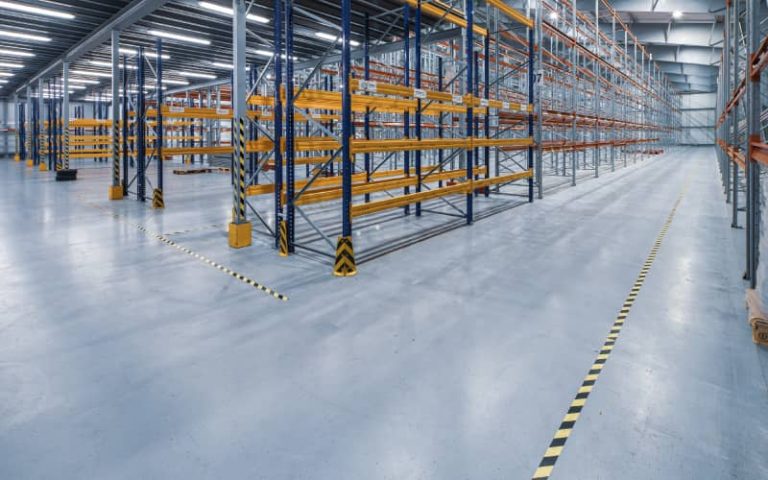Storing oversized or irregularly shaped materials is one of the biggest challenges in warehouse management. Long items like lumber, steel pipes, furniture components, or rolls of carpet simply don’t fit into standard pallet racks. That’s what cantilever racking does, and it’s the reason warehouse operators invested more than $2.5 billion in cantilever racks last year.
If you’ve ever asked, “What is cantilever racking?” or “What is a cantilever rack used for?”, we’ll explain. Whether you’re running a high-volume distribution center or a small fabrication shop, cantilever systems can help you store bulky items more safely and efficiently.
What Is Cantilever Racking?
Cantilever racking is storage designed specifically for long, heavy, or odd-sized materials that fit easily on traditional pallet racks. Unlike pallet racks that have front-facing beams and enclosed shelves, cantilever systems use open arms that allow you to store materials horizontally with easy access from the front. Because there are no vertical supports in the front, forklifts and other equipment can load or unload materials without obstruction.
This design makes cantilever racks ideal for storing:
| Lumber | Furniture frames |
| Metal bars and tubes | Sheet goods like plywood or drywall |
| PVC pipe and conduit | Carpet and textile rolls |
Cantilever systems can be single-sided and set against walls or double-sided with access on both sides, providing flexibility in your warehouse layout.
Key Components of a Cantilever Rack
To understand how cantilever racking works, it helps to know the parts that make up the system:
Uprights
These are the vertical columns that support the entire structure. They’re anchored to the floor and spaced apart depending on the length of materials being stored.
Bases
Bases are horizontal footings at the bottom of each upright. They provide stability and often double as additional load-bearing surfaces.
Arms
These extend horizontally from the uprights and are where the inventory is actually stored. Arms come in various lengths and can be straight or inclined to prevent items from rolling off.
Bracing
Diagonal or horizontal bracing between uprights adds strength and rigidity to the overall system.
Benefits of Cantilever Racking Systems
Cantilever racks are known for their simplicity and versatility, but their real value comes from how they improve your space efficiency and material handling.
Clear, Unobstructed Access
The absence of vertical front columns means forklifts and side loaders can retrieve materials quickly from any level. This speeds up picking and reduces the risk of damage.
Flexible Storage Options
Arms can be adjusted to different heights and lengths, accommodating a wide variety of product shapes and sizes on the same system.
Efficient Use of Space
Cantilever racking turns unused vertical space into productive storage, freeing up valuable floor area and improving your warehouse layout.
Scalable and Modular
Most systems are modular, meaning you can add arms or uprights as your storage needs grow without having to replace the entire system.
Indoor or Outdoor Use
With the right materials and coatings, cantilever racks can be used outside to store lumber, pipes, or construction materials exposed to the elements.
When Should You Use Cantilever Racking?
If you’re storing long, heavy, or non-palletized inventory, cantilever racking is likely your best option.
Use cantilever racks when:
- Items are too long for pallet racks or shelving
- Inventory must be accessed frequently with minimal handling
- You need flexible arm spacing for different item types
- Floor space is limited, and vertical storage can be utilized
- You’re storing products of variable lengths
Cantilever systems also work well in facilities with fluctuating inventory or seasonal product changes, since you can reconfigure them quickly.
Safety and Installation Considerations
Although cantilever racking looks simple, proper setup and safety procedures are critical to ensure long-term performance and worker safety.
Anchoring and Load Support
Cantilever uprights must be securely anchored to a reinforced concrete slab. Always follow the manufacturer’s recommendations for bolt type, spacing, and slab thickness.
Weight Distribution
Ensure materials are centered and evenly loaded across multiple arms. Exceeding arm or upright capacity can lead to bending, collapse, or injury.
Training, Signage, and Compliance
Three things here:
- All warehouse staff should be trained on safe loading and unloading procedures.
- Clearly post load limits on each rack section to prevent overloading.
- Make sure you’re complying with OSHA regulations and Rack Manufacturers Institute (RMI) standards.
Regular Inspections and Maintenance
Inspect for wear, loose bolts, damaged arms, and floor anchoring integrity regularly. Investing in preventative maintenance is the best way to lengthen your equipment lifespan.
A Smarter Way to Store Long and Bulky Items
Cantilever racking may not be the most common storage solution, but for warehouses managing long, heavy, or awkwardly shaped goods, it’s one of the most essential. With open-face access, scalable configurations, and the strength to handle oversized loads, cantilever racks improve organization, boost efficiency, and make better use of your valuable warehouse space.
Conesco Storage Systems offers a wide range of new and used cantilever racking solutions to help warehouses tackle complex storage challenges. From design and layout to installation and permitting, our experts can guide you every step of the way. Connect with Conesco today and get the flexibility your operation needs to grow with confidence.



